This list of the best things to do in Sighisoara contains affiliate links.
During our road trip through Transylvania, there was one place that people were insistent we visited – Sighisoara.
A bit of a mouthful to pronounce (‘sigh-ee-shoh-ra’), this Hansel and Gretel-esque town carries an impressive title: it is Europe’s best preserved and still‑inhabited medieval citadel.
Like something from the pages of a (Transylvanian inspired) fairy tale, this rainbow palette of a place is found nestled beside the waters of the Târnava Mare River. It’s a contrasting town of sugary pink bakeries, winding cobbled streets and – conversely – eery, legends and the incessant sound of cawing crows.
By day, it is idyllic. By night, however, those old Transylvanian tales creep in, as the shadows lengthen and the moon begins to rise.
We spent just one night in Sighisoara during our own road trip around Transylvania, however, we could have absolutely spent longer here (I think two days in Sighisoara is probably enough). It’s a beautiful place, with plenty to see and do – alongside some great restaurants and hotels.
Below is my list of the best things to do in Sighisoara, Romania.
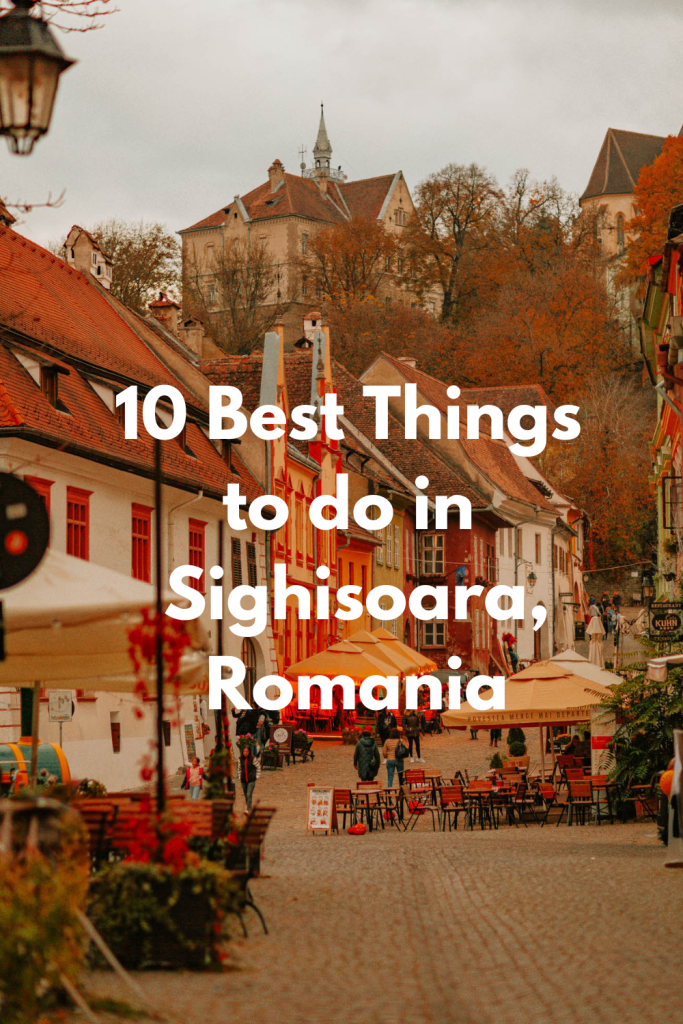
Best Place to Stay in Sighisoara
There are several great places to stay in Sighisoara and it’s definitely geared towards tourism (especially during the summer months, when visitors arrive in their droves).
During our own short break to Sighisoara, we stayed in the very lovely Central Park Hotel. This hotel offered my favourite blend of slightly outdated, yet palatial decor – think vast bedrooms, a sweeping staircase and a great, solid restaurant.
Its location was also ideal – right on the main thoroughfare through town, opposite the iconic clock tower.
Given the size of the rooms (and each decorated very regally), the prices per night are extremely reasonable. A deluxe double room cost us £86 per night during our own stay in October 2024.
Likewise, we heard good things about the extremely cute looking Boutique Hotel von Graf, in the heart of the Citadel. This is a very cosy hotel in Sighisoara and would be perfect on a dark, autumnal night – as candles flicker in its windows.
Prices start at a more expensive £124, if visiting in October.
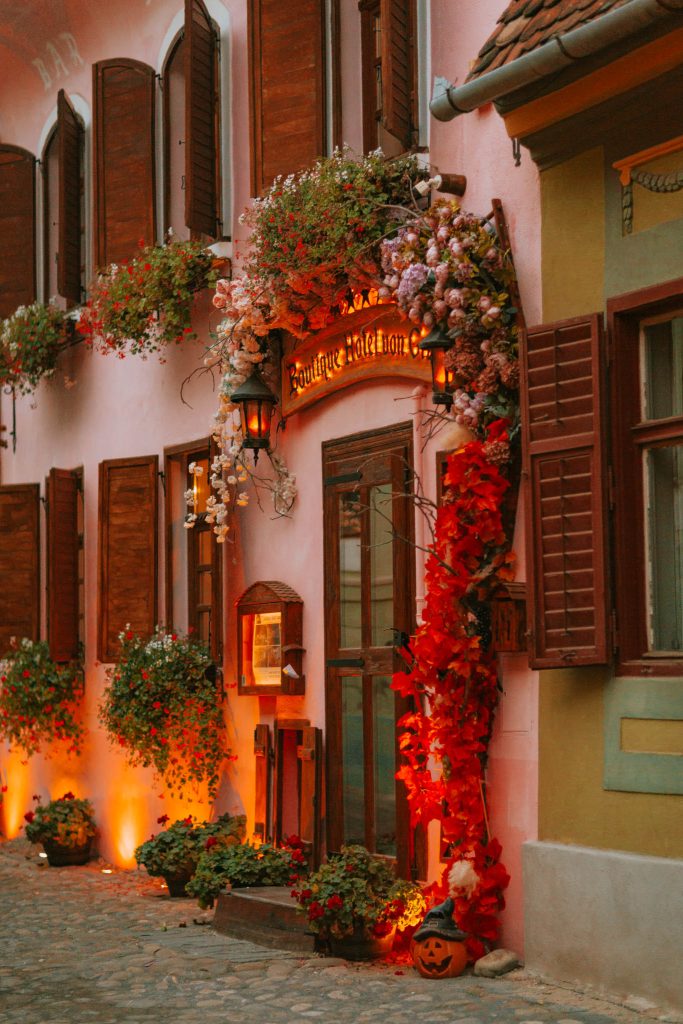
How to get to Sighisoara
Once in Transylvania, getting to Sighisoara is very easy.
From Cluj Napoca
Your best starting point is Cluj Napoca, the unofficial capital of the Transylvania region. You can fly in and out of Cluj from the UK with relative ease (from Luton or Stanstead, with Wizz Air or Ryanair), for as little as £60 return.
From Cluj, you can get a train to Sighisoara, with the CFR InterRegio running every 2 hours and taking slightly over 3 hours. Tickets are just £10 for second class.
Sighisoara’s railway station is at the base of the town’s hill, and is a 10 minute walk or £2 taxi ride to the old town gates. Be warned, it’s steep, so if you’re lugging suitcases behind you, a taxi might be easier.
Alternatively, you could pick up a hire car in Cluj and drive to Sighisoara, with the journey taking around 2 hours 30 minutes.
From Brasov
As Sighiosora was one of our last stops on our Transylvania road trip, we actually visited from Brasov (having begun in Bucharest).
The drive from Brasov to Sighisoara should, in practice, take a little under 2 hours. However, be warned that this particular stretch of road (the E60) does get very backed up, particularly at weekends, so be sure to factor in another hour as minimum.
Alternatively, there are hourly trains from Brasov to Sighisoara – the speed and comfort of which depend on how much you want to pay. The Regio (R) trains are the cheapest, with second-class tickets costing around £4.20.
Next, the InterRegio (IR) trains are faster and more comfortable, and a second-class ticket costs about £8.50.
Lastly, the InterCity (IC) trains are the fastest and most comfy, with second-class tickets setting you back just £11.
Compared to the UK, this still seems an absolute bargain.
From Sibiu
While we didn’t have a chance to visit Sibiu on our own trip to Transylvania, it’s definitely on the list for next time.
For anyone hoping to visit Sighisoara from Sibiu, there’s an hourly train that takes just over two hours. Again, how much you pay is dependent on the operator, but the fastest and comfiest – IC trains – offer tickets from Sibiu to Sighisoara for around £10.
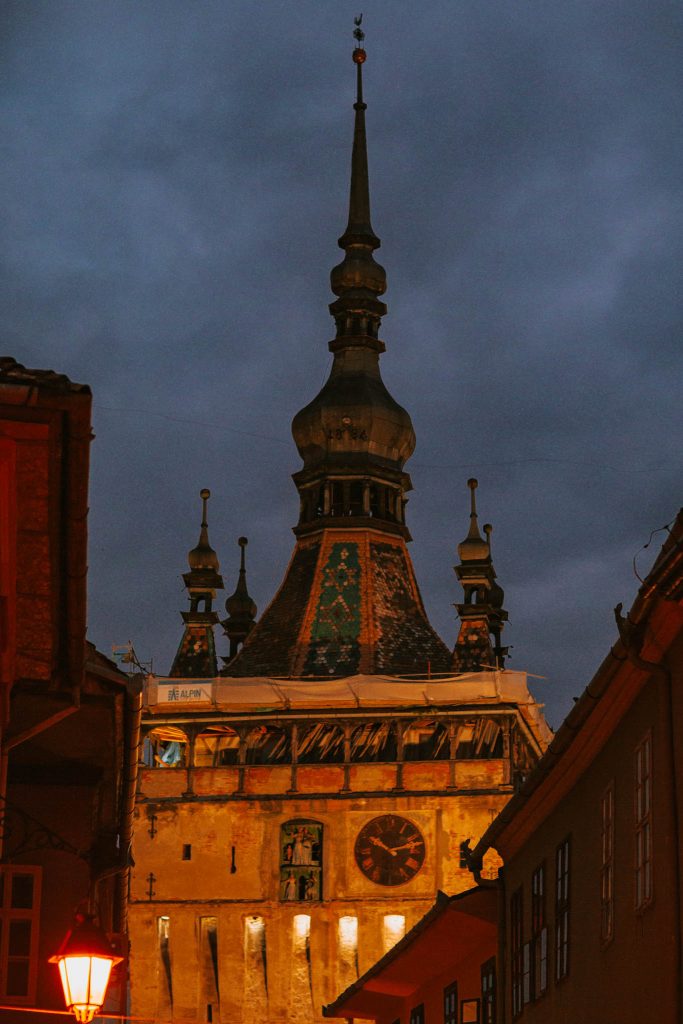
What is the Best Time to Visit Sighisoara?
Romania gets incredibly hot in the summer and bitterly cold come wintertime.
As such, and like much of Europe, the best time to visit Sighisoara is either spring or autumn.
I do think that if I had to choose, I would definitely visit during the autumn – hands down. During this time, the mountains and hills surrounding Sighisoara are awash with autumnal colours and whilst the skies remain largely blue, there is a slight nip in the air.
Autumn transforms Sighisoara from pretty, to absolutely stunning.
Likewise, given Sighisoara’s apparent links to Vlad the Impaler (the inspiration for the character of Dracula), an autumn visit makes sense – just as Halloween arrives and the crows begin to swarm over the rooftops.
Top Things to do in Sighisoara, Romania
For a relatively small place, there are plenty of top things to do in Sighisoara – with each offering a different perspective on this beautiful medieval town.
1. Visit The Clock Tower
When you arrive in Sighisoara’s time-worn citadel, you’ll be hard pressed to miss its enormous and spectacular clock tower (or ‘Turnul cu Ceas’).
Located at the gateway to the Citadel and built in the 14th century, this famous landmark chimes merrily and hourly – offering visitors the chance to see a beautiful little spectacle. On the hour, an array of little characters and figurines, which sit above the clock face, perform a parade – a dance they’ve practiced since their installation in 1648.
These figurines represent justice, peace, day and night (they cleverly swap places at dawn and dusk), and the days of the week – as represented by Roman gods.
Definitely be sure to catch the clock chiming and this little parade, if you can. It’s one of very few medieval clock towers still operating across Europe and is such a special sight.
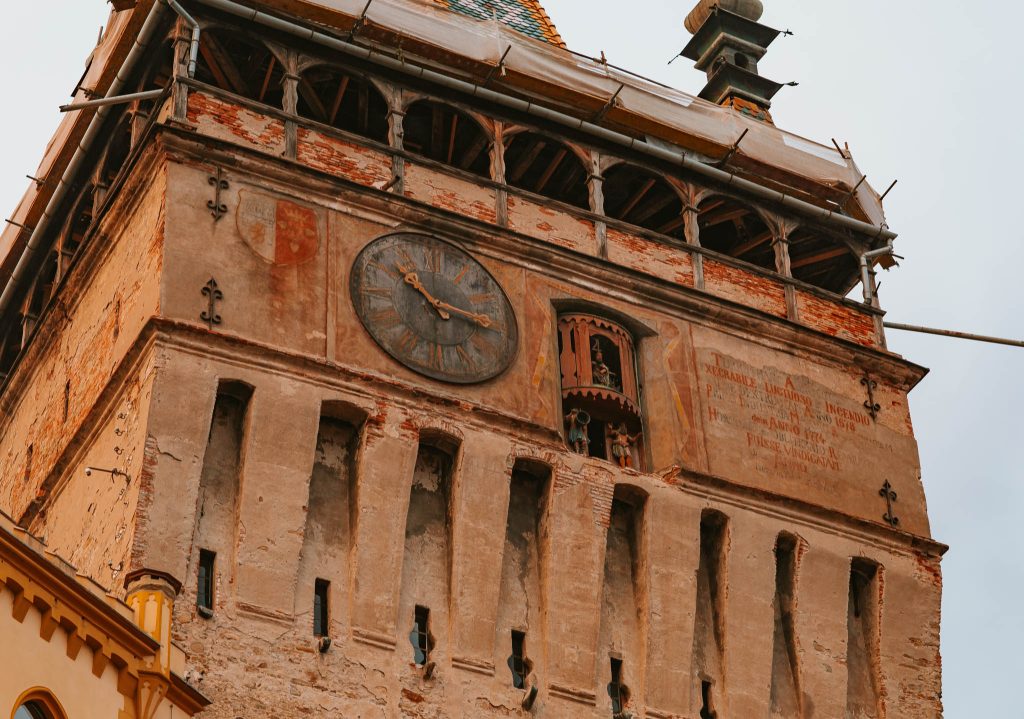
Inside the Clock Tower is a small museum, which costs about £4 to enter. It’s small, but offers visitors the chance to see a small array of artefacts from Sighisoara, dating back to the medieval period, including some interesting torture instruments.
Perhaps one of the best things about the Clock Tower is that it’s fairly easy to climb, and there’s an observation deck at the top (it’s 64 meters high).
After a climb of 150 steps, this deck offers some great views of the nearby river, the forests that decorate the surrounding hills, and Sighisoara’s medieval rooftops.
Just be sure not to visit Sighisoara’s clock tower at night, it’s said that this is when the ghosts of the Saxon craftsmen return to the clock, ensuring it continues to function (how diligent of them).
2. Gorge on Papanasi in the Citadel’s Town Square
Sighisoara’s main town square (Piața Cetății) is unbelievably pretty.
A courtyard of pink, peach, dusty blue and green washed buildings, the square lurches upwards and downwards, along ancient cobbled streets. Nestled within the fortified citadel, the square is fairly small (especially compared to those grand Italian piazzas) but this just makes it feel even more homely and magical.
At night, candles flicker in the windows of the 16th century buildings, and families gather under blankets to enjoy dinner al fresco.
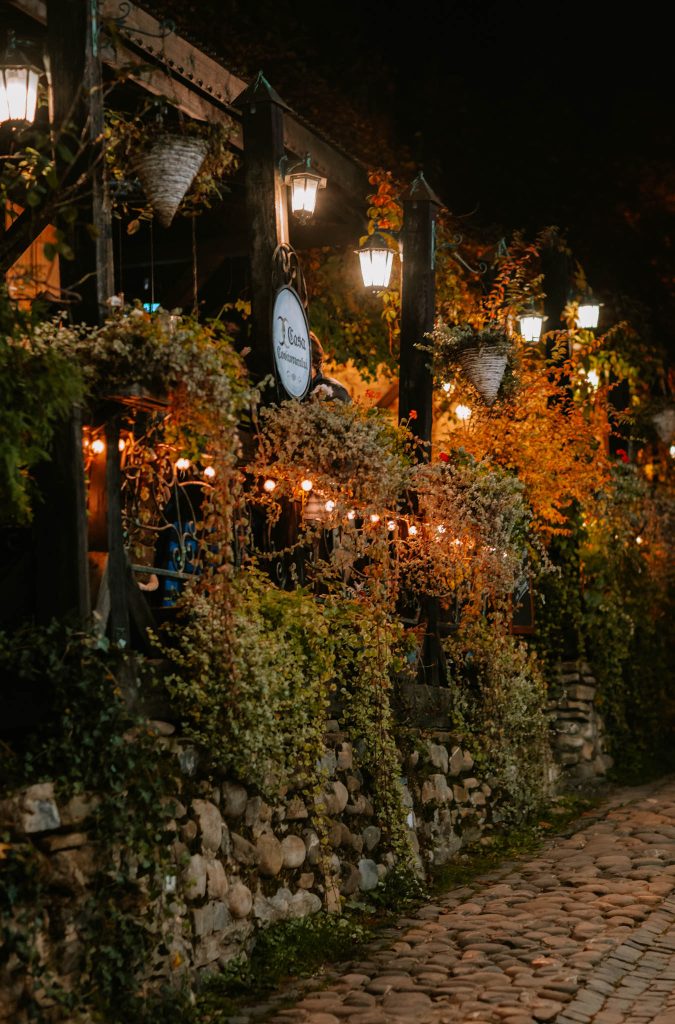
Here, you’ll find lots of cafes selling papansi (pah-pah-nash) – Romanian doughnuts. Made from a cow’s cheese (brânză de vaci) – similar to ricotta – and served with blueberry compote and sour cream, these are out of this world delicious. Eating a small mountain of these is definitely one of the top things to do in Sighisoara.
We enjoyed them while watching the autumn sun set across the medieval square – and it was just perfect.
While walking through the square, be sure to keep your eyes peeled for a few hidden gems. The courtyards behind the square – accessed via alleyways – are beautiful, and often feature frescos or murals. Also be sure to visit Casa Cositorarului café – the papanasi here are to die for and it has a very cosy, medieval atmosphere.
3. Visit Sighisoara’s Cemetery (At Night)
Definitely one of the top things to do in Sighisoara, especially during spooky season (we visited Sighisoara a few days before Halloween), is to take a nighttime visit to its hilltop Saxon cemetery.
On the face to if, I recognise that this sounds far from appealing – but it’s unbelievably atmospheric. As it is a little bit unnerving in the pitch black, perhaps visit as the sun sets, as the views across the valley are beautiful.
Take the long flight of stairs up Sighisoara’s famous covered staircase (also known as the Scholars’ Stairs) and you’ll reach the graveyard. Here, tombstones date back nearly 400 years and today loved ones still leave lit candles by the graves – each one flickering gently across the hillside.
Originally a German cemetery, this spot is filled with ornate, leaning and crumbling headstones – covered in ivy and in summer, delicate flowers.
We did agree to take a tour here at night and while creepy, it was unforgettable. Our guide shared spooky stories belonging to the town, alongside its links to Vlad the Impaler.
Follow the School Hill path back down to the Citadel for some extra special views of the valley or (and if it’s open) be sure to pop into the church, to visit its crypt.
4. Visit Turnul Cizmarilor (the Shoemaker’s Tower) at Dusk
Another top thing to do in Sighisoara is to take a walk up to the Turnul Cizmarilor at dusk.
During our own visit, we happened upon this tower as we strolled the Citadel at dusk. Wandering the town’s winding cobbled alleyways, past row upon row of ancient homes, we found ourselves at the top of a hill next to this Tower – with the beautiful Târnava Mare Valley falling away below us.
The view was spectacular and what made it suitably atmospheric was the large swarm or crows overhead; preparing to roost for the night. As the sun set, and the caws of the crows echoed across the valley, Sighisoara seemed the perfect spot to enjoy Halloween.
On the way back down, please be sure to pass by the beautiful Boutique Hotel Von Graf – it is very photogenic and perfect for Instagram.
5. A Cursory Visit to the Infamous Casa Vlad Dracul
I’ll be honest, when writing about our halloween trip to Transylvania, I’ve tried to avoid recommending any of the tourist traps relating to Dracula. Most are overpriced and are nothing more than commercial spin.
However, this ‘attraction’ in Sighisoara does, at least, lack the crowds found at nearby Bran Castle.
The apparent birthplace of Vlad Țepeș, (Vlad the Impaler), the violent historical figure that inspired Dracula, Casa Vlad Dracul can be found in the main square of the Citadel. One of the oldest stone buildings in the town, this (somewhat normal looking) home is where a young Vlad is said to have started his days – before his lust for blood and death began.
Today, the building is a restaurant (although reviews aren’t great), so it might just be best to have a quick walk past it, whilst in town.
6. Enjoy a Cosy Dinner at Casa Cositorarului
In terms of the best places to eat in Sighisoara, this little town has plenty of romantic and appropriately medieval-esque restaurants.
One place we ate at, that I can recommend, is Casa Cositorarului, found in the heart of the medieval citadel.
Visting here is a little like visiting your Grandma’s house – a cosy, intimate space that feels like a front room. Outside, the Saxon courtyard (for the warmer months) is filled with fairy lights and feels wonderfully magical.
Other great places to eat in Sighisoara include the Joseph T. Restaurant & Wine Bar (outdated interior – a bit 1990s – but otherwise nice modern Romanian food), Casa Georgius Krauss, for upscale dining in a 16th century building and the very sweet Atelier Coffee Shop, for a morning coffee (they also do great warm pastries).
7. Visit Nearby Viscri
Although not strictly one of the best things to do in Sighisoara per se, a trip to nearby Viscri is a must.
We visited Viscri on our way to Sighisoara from Brasov and it was everything I had hoped.
A beautiful Saxon village, now a UNESCO site, Viscri is not just a quiet, pastoral spot, but a place our very own King Charles owns a house (a little bizarrely).
Indeed, having visited Transylvania a number of time, the King is said to have become enchanted with quaint little Viscri, and bought a traditional farm house there in 2006. Dedicated to sustainability and conservation, the King then oversaw the careful restoration of the house – ensuring traditional Romanian craftsmanship were used throughout.
Today, the farmhouse, now a small museum and guesthouse, is a beautiful place to visit – you can even see the room where the King has slept.
Aside from the King’s home, Viscri is also home to a stunning fortified church, built by the German Saxons in the 13th century (on top of a much older site, dating back to 10th century).
Today, the church is a beautifully peaceful place to explore – and includes a selection of carefully conserved artefacts, found throughout the church’s lands. The view from the tower is worth the very short climb – providing views of Transylvania’s rolling, ever-green countryside.
A visit to Visci is not just a chance to see where a British King has made a home, but to experience real, pastoral Romania – a place where horse and carts still wheel slowly by and wild horses gallop through fields.
8. Visit Teo’s Cellar for a Tipple
If you are hoping to sample a taste of Transylvanina wine (it’s surprisingly good), then head to Teo’s Cellar.
Run by the (you guessed it) friendly and charismatic Teo, this is a great place to come to sample a wide range of local and national drinks.
Hidden in a medieval cellar, this cosy – and fantastically atmospheric – celler is the place to come for an in-depth dive into the local wines and (blow your head off) berry liquors. This is a great place to come for presents and upstairs, Teo runs a well-reviewed guesthouse.
9. Visit the M Museum (House of Maps & Swords)
If you’re a fan of medieval weapons and fierce looking swords, then look no further than the M Museum.
Nestled in the middle of the Citadel, this small, but perfectly formed, museum is a great insight into Sighisoara from long ago. Everything on display comes from a private collection and includes one of the largest collections of old books in Transylvania – which is fascinating to see.
The collection of maps on display are also worth looking at – as they show the ever changing boundaries and communities throughout Transylvania, from Germans to Hungarians, Slavs and Saxons.
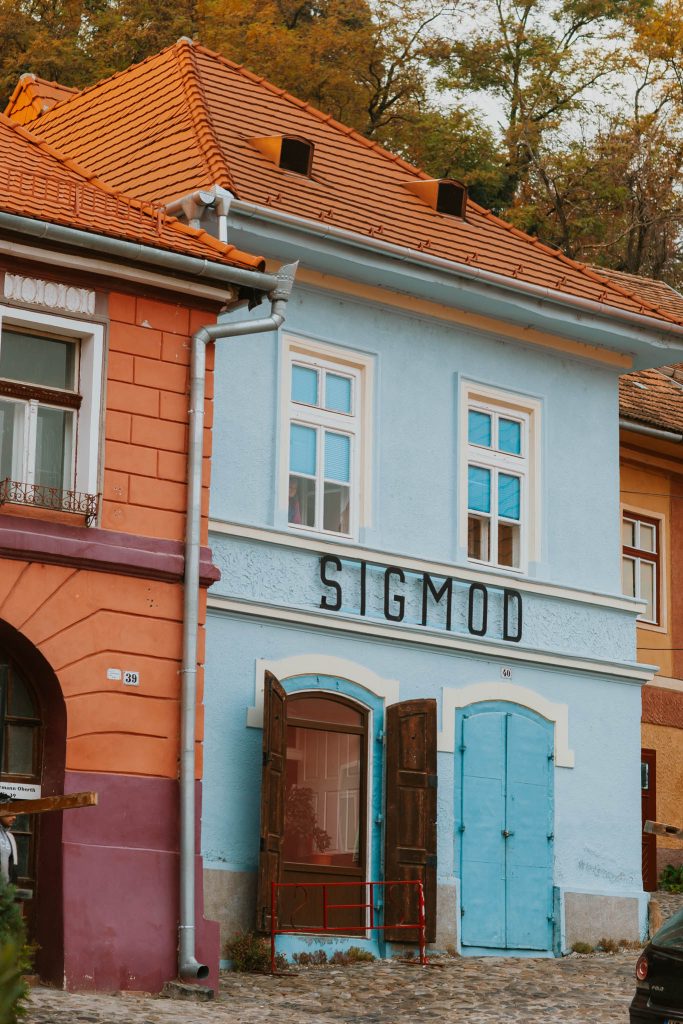
10. Attend Sighisoara’s Medieval Festival
What better place to visit and enjoy a medieval festival, than in Sighisoara – a town apparently transported straight from the medieval period.
Every July, Sighisoara dusts down its suits of armours, finds its minstrels and puts on a fantastic and very popular medieval festival.
Taking place annually the last weekend of July, guests can wander the Citadel’s meandering lanes, visiting craftsmen, watching sword fights and sampling some authentic medieval fare – all while surrounded by one of the finest medieval citadel’s in Europe.
The festival is a real spectacle and attracts over 20,000 visitors – so if you do visit, be prepared for the crowds.
As the sun begins to set, the town becomes an open air concert – with dancing, music and the occasional jousting event. It is incredibly atmospheric and a lot of fun, with Sighisoara providing the perfect back drop for such an occasion.
Final Thoughts: Is Sighișoara Worth Visiting?
If you are taking a road trip through Transylvania and are wondering if it’s worth stopping in Sighisoara, then the answer is absolutely ‘yes’.
A city of two distinct parts – the modern town, lying down in the valley and an immaculately preserved citadel towering over it – Sighisoara is far from the Transylvanian ‘horror’ town you might expect.
Neither dark, nor gloomy, this medieval fortress is awash with colour – from its beautiful clock tower, to the line of rainbow buildings that fill the central square. Although the odd nod to Dracula can be found throughout, by and large this is a town celebrated for its history, breathtaking architecture and stunning views.
In fact, it’s often voted one of the prettiest spots in all of Romania.
We absolutely loved our short break to Sighisoara – so much so that we are planning to return for its Christmas markets this winter.
We cannot wait.














